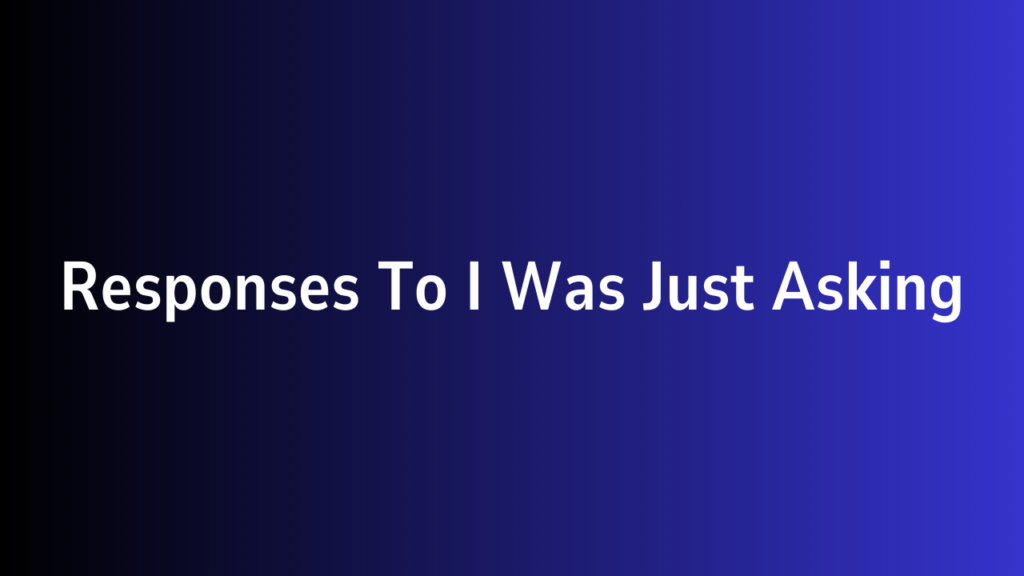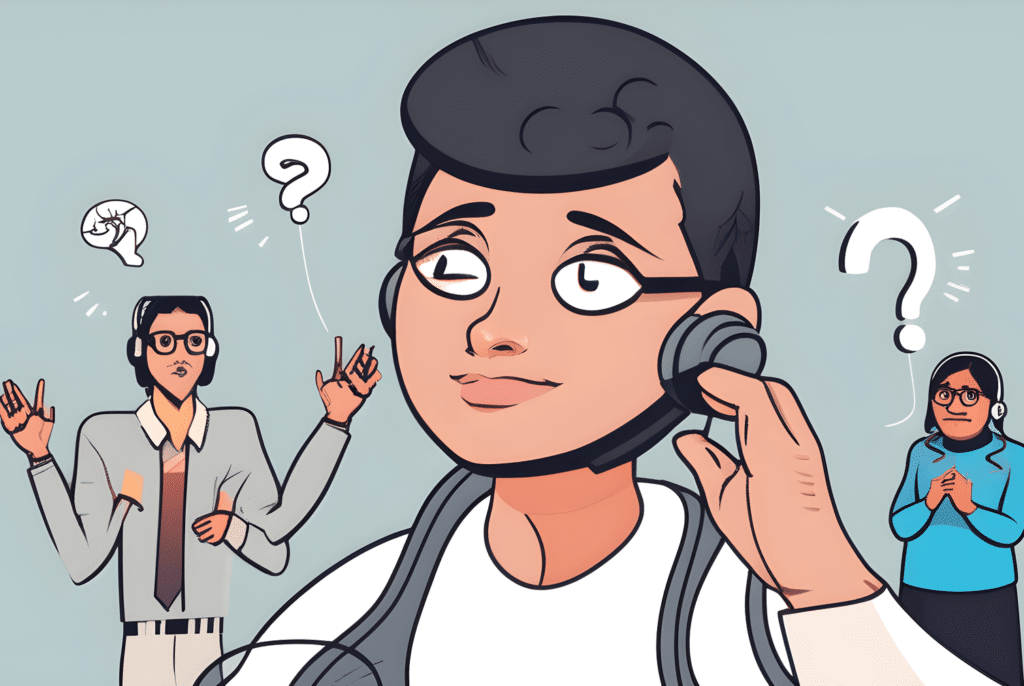Have you ever found yourself caught in a conversation where someone suddenly says, “I was just asking,” and you’re unsure how to respond? Maybe you feel confused, defensive, or even embarrassed. While this phrase is often used casually, it can carry various tones and meanings depending on the situation and the relationship you have with the person. Whether it’s a question about personal matters, a work-related inquiry, or just an innocent curiosity, understanding how to respond to “I was just asking” can help keep conversations smooth and free of awkwardness.
In this blog post, we’ll explore different types of scenarios where someone might say “I was just asking” and how you can respond appropriately. We will also delve into strategies for handling these situations with confidence and clarity. By the end of this post, you will feel equipped with various responses, whether you want to maintain politeness, lighten the mood, or address a more serious situation.
Why “I Was Just Asking” Matters in Conversations
Before we dive into responses, it’s important to first understand why the phrase “I was just asking” is used and what it signifies in different contexts.
- Clarification of Intentions:
- Often, when people use this phrase, they’re trying to clarify that they didn’t mean to offend or intrude. It’s a way of saying, “I didn’t intend for my question to be too personal or probing.”
- Lightening the Mood:
- In casual conversations, “I was just asking” is sometimes used to diffuse any tension that may have arisen. It can make the conversation feel less confrontational and more friendly.
- Deflection of Responsibility:
- Sometimes, people use this phrase to backtrack or deflect any perceived awkwardness. They might be trying to avoid any discomfort that came from their question, especially if they think it was too direct.
- Casual Curiosity:
- In other cases, it’s simply a way of acknowledging that the question wasn’t meant to carry any weight. It’s just a part of everyday conversation where curiosity naturally arises.
Understanding these reasons will help you navigate how you choose to respond, whether you want to de-escalate any potential tension, clear up a misunderstanding, or continue the conversation naturally.
General Guidelines for Responding to “I Was Just Asking”
When someone says “I was just asking,” the best response depends on the tone and intent behind their words. Here are a few general guidelines for responding:
- Stay Calm and Collected:
- Don’t let the phrase throw you off or make you feel uncomfortable. Responding with calmness and confidence helps maintain a smooth flow in the conversation.
- Clarify if Needed:
- If you feel that the question was too personal or inappropriate, you might need to ask for clarification. A polite response can help both you and the other person understand where each of you is coming from.
- Use Humor (If Appropriate):
- In less serious situations, humor can be an excellent way to diffuse awkwardness. A lighthearted response can make the interaction feel more relaxed.
- Acknowledge the Curiosity:
- Sometimes, simply acknowledging that the person was only asking can be a way to move forward in the conversation. It lets them know that you understand they weren’t trying to cause any discomfort.
- Set Boundaries Politely:
- If the question felt too intrusive or personal, this is your opportunity to set boundaries while remaining respectful. You can kindly let the person know that the question is a little too much for you.
Types of Responses Based on Scenarios
Now let’s dive into how to respond to “I was just asking” in different situations. Depending on the nature of the question and the relationship with the person, your response might vary.
1. In Casual Conversations or Among Friends
When a friend or acquaintance uses “I was just asking,” it’s often part of an easygoing chat. They may be curious about something, and the question may be lighthearted or harmless.
- Playful Responses:
- “Haha, no worries! I know you were just being curious.”
- “You’re always so curious! It’s okay, I don’t mind.”
- “Oh, you! Always asking the best questions.”
- Grateful Acknowledgment:
- “Thanks for asking, I’m glad you’re interested.”
- “I appreciate your curiosity, it keeps me on my toes!”
- Deflecting with Humor (If the Question is Too Personal):
- “Well, that’s a question I wasn’t expecting today!”
- “You’ve got some bold questions, my friend.”
These responses work well when you’re keeping the mood light and friendly. You’re acknowledging their curiosity while maintaining a playful tone that keeps things fun.
2. In More Serious or Formal Settings (Workplace or Professional)
If a colleague, boss, or client uses the phrase “I was just asking,” it could imply they were making a direct inquiry for information, perhaps related to work or a professional matter. Your response should be polite and focused on providing clarity.
- Professional and Clear Response:
- “Thanks for asking! Let me explain that for you.”
- “I appreciate your question. Let me clarify.”
- “I was happy to answer your question, no problem.”
- Addressing a Specific Question:
- “I understand you were just asking, but let me provide some more context to make sure we’re on the same page.”
- “I see, and I’m happy to provide more details if you need.”
- Offering Further Assistance:
- “If you need more information, feel free to ask!”
- “I’m happy to help with any other questions you might have.”
These responses acknowledge that the person is simply asking, and you respond by offering more clarity or continuing the conversation in a constructive manner.
3. When Someone Asks a Personal or Invasive Question
If the phrase “I was just asking” follows a personal or invasive question, it may indicate that the person senses they might have crossed a line. In such cases, you can choose how to respond based on how comfortable you are with the situation.
- Setting Boundaries Politely:
- “I appreciate your curiosity, but that’s a bit too personal for me.”
- “I’d prefer not to discuss that, but I appreciate you asking.”
- “That’s something I’d rather not get into right now, thank you for understanding.”
- Reassuring and Redirecting:
- “I know you didn’t mean to make me uncomfortable, but let’s talk about something else.”
- “I understand you were just asking, but I’m not ready to talk about that.”
- Lightly Deflecting the Question:
- “Well, that’s one way to ask! But let’s change the topic.”
- “Haha, curious as always! But let’s talk about something else, shall we?”
These responses help you maintain your personal boundaries while being polite. You don’t have to answer every question, and it’s okay to redirect or set limits in a respectful way.
4. In Response to a Question That Feels Defensive
Sometimes, when someone says “I was just asking,” it might be in response to a question you’ve asked them or a situation where they feel they need to defend themselves. In such cases, your response should be calm and reassuring.
- Reassuring and Understanding:
- “I didn’t mean to make you feel defensive. I was just curious.”
- “I understand, and I didn’t want to make you uncomfortable.”
- “No need to explain, I was just asking. It’s all good.”
- Clarifying Your Intentions:
- “I was just asking out of curiosity, no offense meant.”
- “My question wasn’t meant to make you feel bad. I’m just interested in your perspective.”
These responses help to de-escalate the situation by acknowledging their feelings while explaining your own intentions behind the question.
5. When You Don’t Want to Answer
If you simply don’t feel like answering the question, but the person says, “I was just asking,” you can handle the situation politely without feeling pressured.
- Politely Declining to Answer:
- “I’d rather not talk about that right now.”
- “I’m not in the mood to discuss that.”
- “That’s something I’m keeping private, thank you for understanding.”
- Redirecting the Conversation:
- “I’d prefer not to answer that. How about we talk about something else?”
- “I’m not comfortable with that question, but what have you been up to lately?”
These responses provide a gentle way to maintain your privacy while keeping the conversation on track.
Table: Responses to “I Was Just Asking” Based on Different Scenarios
Here’s a handy table summarizing responses based on different situations:
| Scenario | Possible Responses |
|---|---|
| Casual Conversations (Friends) | – “Haha, no worries, I know you were just curious!” – “I appreciate your curiosity!” |
| Professional or Work-Related | – “Thanks for asking! Let me explain.” – “I’m happy to clarify any details.” |
| Personal or Invasive Questions | – “I’d prefer not to discuss that, but thanks for asking.” – “That’s a bit too personal, let’s talk about something else.” |
| Defensive Tone | – “I didn’t mean to make you feel defensive, I was just curious.” – “No need to explain, I was just asking.” |
| Declining to Answer | – “I’d rather not talk about that right now.” – “I’m not comfortable answering that question.” |
Conclusion: Navigating Conversations with Confidence
Understanding how to respond to “I was just asking” can help you navigate conversations smoothly and with grace. Whether you’re dealing with a casual inquiry, a professional question, or a personal matter, knowing how to respond appropriately allows you to maintain respect, set boundaries, and keep the conversation flowing naturally. Whether you’re keeping things lighthearted with friends or deflecting a more serious question, your response will show emotional maturity and communication skills.
Remember, it’s okay to set limits on what you’re comfortable discussing, and it’s equally okay to use humor or deflection to steer a conversation in a direction that feels right for you. At the end of the day, effective communication is key to building and maintaining strong relationships, and learning how to respond with confidence is an essential part of that.



